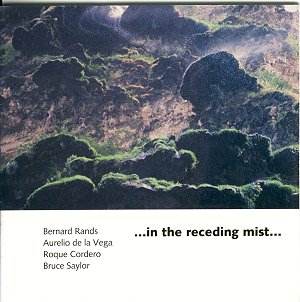North/South Consonance Inc. is a non-profit organization
devoted to the promotion of music by living composers, mainly from the
Americas. However the composers featured here include the British-born
Bernard Rands who is now active and living in the States. His "...in
the receding mist...", completed in 1988, gives this release
its collective title. This beautifully lyrical piece is scored for the
Ravel-like combination of flute, harp and string trio. (The title derives
from a early poem by Samuel Beckett.) It is a fairly straightforward
piece based on three musical 'tiles': a simple, folk-like melody, a
dotted rhythmic motive and a "mordent/turn figure". These
are constantly varied, embellished and transformed into a more complex
structure out of which a long cantilena played by the flute emerges
and brings he work to its conclusion. A beautifully atmospheric piece
of musical impressionism.
Aurelio de la Vega, born in Cuba, has been fairly active
as a teacher in the States whereas a good deal of his music has been
widely performed and recorded (some of it was available on various,
now long-deleted LPs). His Testimonial, recorded here,
was completed in 1990. Three of its five movements are settings for
soprano and ensemble of poems by Armando Valladares who has been a political
prisoner in Castro’s jails for more than twenty years. These beautiful
poems deal with imprisonment, revolt and hope. In the first song, the
prisoner has not abandoned any hope for "they have been incapable
of depriving me of the singing of the rain". This is followed by
a nervous, ghostlike Scherzo (In Memoriam Alberto Ginastera)
recalling the Argentine composer’s own Scherzos. (This movement is actually
based on phrases from Ginastera’s First Piano Sonata.) The second song
Premonicíon is also about hope for a better future. The
following Adagio is the second purely instrumental movement and
the emotional climax of the piece. It is also its finest movement. In
the middle section of this sorrowful, atonal movement, a distant piano
plays a Cuban danza, a nostalgic evocation of times past. A wonderful
moment indeed. The final song is again a "dramatic explosion of
faith": "It does not matter that you have the keys if I have
in my soul liberty and love". De la Vega’s music is clearly 20th
Century, mostly atonal but with much emphasis on Cuban dance rhythms.
A beautifully moving piece of music.
Roque Cordero, from Panama, is the oldest composer
featured here. Some of his music (e.g. his Violin Concerto)
has been available on discs during the LP era, but very little of it
is available now though his music is still frequently played in America.
His Dodecaconcerto of 1990 is scored for a mixed ensemble
of twelve players, hence its title. Cast into three fairly traditional
movements (sonata-allegro, song-like slow movement, rondo) the Dodecaconcerto
is a lively, colourful work which made me think of Revueltas (and I
mean it as a compliment for I consider Revueltas as Mexico’s greatest
composer). The music, often based on folk-dance rhythms, is nervous,
crisp, mildly dissonant but on the whole quite accessible. A minor masterpiece
on all counts.
The last piece by the Philadelphia-born Bruce Saylor,
is a song cycle for mezzo-soprano and mixed ensemble on poems by African-American
women. The cycle See You in the Morning was written in
1986 at the suggestion of Jessye Norman though it is not sure that she
ever sang it. The various poems are in turn wistful, tender, humorous.
The piece ends with a poem of hope and goodwill : "I am the woman/offering
two flowers/whose roots/are twin. Justice and Hope. Let us begin".
This is a very fine work, beautifully written in a very accessible idiom.
Well worth having for it also repays repeated hearings.
The performances seem excellent to me, committed and
thus convincing. I would certainly like to hear more of these composers’
music. Recommended.
Hubert CULOT
Information about North/South Consonance may be found
on www.northsouthmusic.org
or in writing : N/S Recordings, PO Box 5081, Albany NY 12205-0081.


